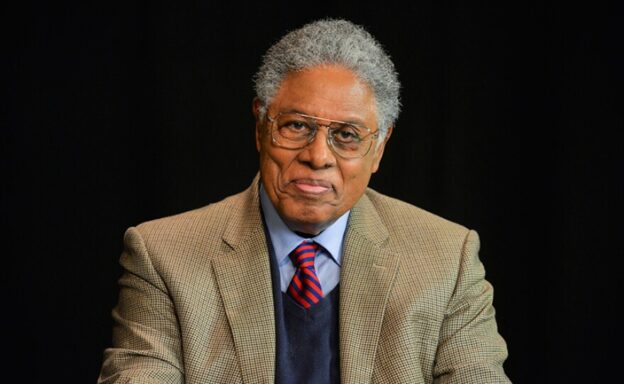Thomas Sowell, a renowned economist and author, has consistently been a voice in debates surrounding race, economics, and politics for over five decades. While many characterize his perspectives as conservative, it’s crucial to delve deeper and discern the essence of his arguments: a rigorous reliance on empirical evidence.
Contents
Evidence of Conservative Bias
Thomas Sowell is often identified with conservative viewpoints, but it’s important to avoid taking a stance and to present information as objectively as possible. However, understanding his perspective can be beneficial in contextualizing his work.
Books, Writings, and Works
Here are some examples of where Sowell’s viewpoints align with conservative perspectives or where his works have been interpreted as such:
- Race and Economics (1975): In this book, Sowell argues against the effectiveness of race-based affirmative action policies, suggesting that they often end up harming the very groups they intend to help. His view challenges many liberal perspectives on affirmative action.
- The Vision of the Anointed (1995): In this book, Sowell criticizes what he perceives as the liberal intelligentsia’s presumptive belief that they know what’s best for society. He refers to these people as “the anointed” and critiques their policies and views.
- Economic Facts and Fallacies (2008): Sowell discusses various economic myths. He often challenges ideas associated with progressive policies, such as rent control and gender wage gap interpretations. His analysis often sides with a free-market approach to many issues.
- Intellectuals and Society (2009): Sowell discusses the adverse consequences of intellectuals’ influence on various societal matters. He tends to critique the predominantly liberal perspectives that are found in academia and the intellectual community.
- Dismantling America (2010): Here, Sowell is critical of various policies and cultural shifts in America, many of which were implemented or supported by liberal policymakers. He expresses concerns about how they could lead to the decline of American civilization.
- Charter Schools and Their Enemies (2020): Sowell defends charter schools, often favoured by conservatives, against criticisms that are commonly voiced by liberal educators and policymakers. He provides evidence suggesting that charter schools, particularly in inner cities, offer valuable educational opportunities for minority students.
Personal Life and Public Comments
In his personal life and public comments:
- Affiliation with Conservative Think Tanks: Sowell has been a senior fellow at the Hoover Institution, a public policy think tank located at Stanford University, since 1980. The Hoover Institution is often associated with conservative and libertarian viewpoints.
- Columns and Commentary: Sowell’s syndicated columns, which have been published in newspapers nationwide, often advocate for conservative principles, especially in relation to economic policy, race relations, and education.
- Public Endorsements: Sowell has publicly endorsed several Republican candidates over the years, aligning with conservative politics.
It’s essential to understand that while Sowell’s viewpoints align with many conservative principles, he often emphasizes the importance of empirical evidence and data in his arguments, irrespective of political alignment. As always, it’s beneficial for readers to engage with his work firsthand and form their own judgments.
A Conservative Lens or an Empirical One?
Upon superficial examination, it’s easy to label Sowell as a conservative intellectual. His affiliations, writings, and endorsements echo a lot of the sentiments popular in conservative circles. From his critique of race-based affirmative action policies in “Race and Economics” (1975) to his defence of charter schools in “Charter Schools and Their Enemies” (2020), Sowell’s conclusions often converge with conservative standpoints.
Moreover, his association with institutions like the Hoover Institution and the themes explored in his books such as “The Vision of the Anointed” (1995) and “Dismantling America” (2010) further solidify his image as a conservative thinker.
However, pigeonholing Sowell as merely a conservative intellectual might be an oversimplification. While his viewpoints often resonate with conservative ideologies, the crux of Sowell’s philosophy isn’t about being right-leaning or left-leaning, but being “data-leaning.”
Empirical Evidence: The Cornerstone of Sowell’s Arguments
Throughout his expansive body of work, Sowell continually underscores the importance of empirical data. His conclusions are not drawn from emotional or ideological predispositions but are based on evidence and rigorous analysis. For instance, in “Economic Facts and Fallacies” (2008), he busts common myths associated with economic principles, challenging both progressive and conservative narratives, solely grounded in empirical findings.
Sowell’s insistence on evidence-based arguments means that he might arrive at conclusions that are uncomfortable for both ends of the political spectrum. Yet, this dedication to truth-seeking, irrespective of where the evidence might lead, showcases his commitment to intellectual honesty.
Navigating a World of Bias
In today’s polarized world, any stance or argument is prone to accusations of bias. It’s not uncommon for figures like Sowell, whose work challenges established narratives, to face such allegations. However, terming Sowell’s work as “conservative bias” misses the mark.
Sowell’s writings serve as a beacon for those who believe that truths should be grounded in reality and not swayed by popular sentiment. He uses empirical data as a compass, guiding him through the murky waters of socio-economic discourse.
Conclusion
Bias, in any form, can be detrimental, blurring the lines between fact and fiction, truth and lies. While Thomas Sowell’s conclusions may align with conservative principles, they stem from a profound respect for empirical evidence. Rather than viewing him through the narrow lens of political alignment, recognizing Sowell as an objective seeker of truth provides a more holistic understanding of his contribution to intellectual discourse. In a world often swayed by emotions and rhetoric, the value of Sowell’s empirical approach is immeasurable.
